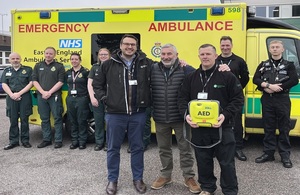Environment Agency officers saved life of trainer
Two members of the Environment Agency have been recognised after their actions helped save the life of a trainer who had a cardiac arrest in their office.

Group shot of those who attended on the day. Left James Carter EA, Carl Tibbles and Matthew Bailey EA.
James Carter and Matthew Bailey work in the Environment Agency’s Mid Suffolk Field Team working to reduce the risk of flooding in the area.
Staff were attending a team training session in Ipswich on November 3 last year when their trainer, Carl Tibbles, began to feel unwell. During a break in the team’s training session Mr Tibbles was found by Mr Bailey unresponsive and struggling to breathe. He was suffering a cardiac arrest.
Mr Carter called 999 while Mr Bailey ran to grab the team’s defibrillator. The colleagues provided CPR, cardiopulmonary resuscitation, to Mr Tibbles and continued to do so until after medical crews arrived. In total, Mr Carter and Mr Bailey provided three shocks using the defibrillator.
All Environment Agency field teams are trained to be able to carry out CPR in case of emergency while they are out in the field.
Teams from Suffolk Police and the East of England Ambulance Service helped to treat Mr Tibbles at the scene. His heart was made stable enough for him to be taken to hospital where he was further stabilised. Mr Tibbles has since been discharged from hospital and has returned to work.
Hours after helping to save Mr Tibbles’ life Mr Carter and Mr Bailey returned to their day job and headed out to the River Deben. Here they checked for blockages to help reduce flood risk reassured concerned local residents.
On March 11, all three men were reunited with responders from Suffolk Police and the East of England Ambulance Service who also attended the scene that day.
Mr Carter and Mr Bailey were both successfully nominated for a resuscitation award from the Royal Humane Society and were presented with their certificates.
Mr Tibbles said:
Myself, my wife, and family will be forever in Matt, James’s, and the emergency services debt for saving my life on the 3 November 2023. I will never be able to thank them enough for what they did on that day.
Medical professionals have been amazed at the job Matt did clearly putting excellent first aid training skills to very good use. I know Matt doesn’t like a fuss, but both him and James thoroughly deserve the award (and more) as without them I wouldn’t be here.
Matthew Bailey said:
I just happened to be in the right place at the right time and something just didn’t feel right. My curiosity got the better of me and thank goodness it did. It all happened so fast, I didn’t really think about it and my training just kicked in.
Fortunately, I also had James to help me and I want to express my sincere thanks to him too. He and I made a great team on the day.
I’ve been to training sessions with Carl since and it’s been really nice to see him back working.”
Mr Carter added:
Matthew Bailey is my hero! His clear head and speedy actions certainly made the difference. The training kicked in and we were very fortunate to give Carl a fighting chance. Meeting Carl with his wife just a few weeks after was an incredible experience.
The Environment Agency puts health, safety and wellbeing at the forefront. The support we have received since from Adam Lunn, the Area Leadership team, and Area Directorate since has been amazing, we are very grateful.
We also cannot thank the emergency services enough for their rapid response and actions. We were in awe of what they were able to do on site.
Adam Lunn, Incident Response Coordinator for the Environment Agency said:
We’re all incredibly proud of the actions both James and Matthew took during Carl’s cardiac arrest.
Undertaking CPR is something a lot of people are trained to do but few have delivered. Less than 1 in 10 people survive a cardiac arrest. It takes courage to perform CPR and the calm and prompt actions from James and Matthew undoubtedly saved Carl’s life.
East of England Ambulance Service NHS Trust Leading Operations Manager Andy Benson said:
The chances of surviving a cardiac arrest out of hospital are slim but are increased when the right steps are taken.
James and Matthew recognised that Mr Tibbles was in cardiac arrest and knew what to do. They provided good CPR immediately and used the defibrillator until we came and provided advanced life support.
If one of those links in the chain of survival had been missing, it could have impacted on Mr Tibble’s outcome. This highlights the importance of learning CPR and knowing where your community defibrillators are.
Inspector Gary Miller from Suffolk Constabulary said:
Our officers responded to a call for a concern for a person suffering a medical incident. Thankfully, alongside others, they were able to support the individual.
We are very grateful those that helped the man on that day, including our officers, have been recognised and thanked. However, I know the officers involved would say the most important thing is that the person is safe and well.”
Notes to editor
- For further information on carrying out CPR please visit: https://www.resus.org.uk/